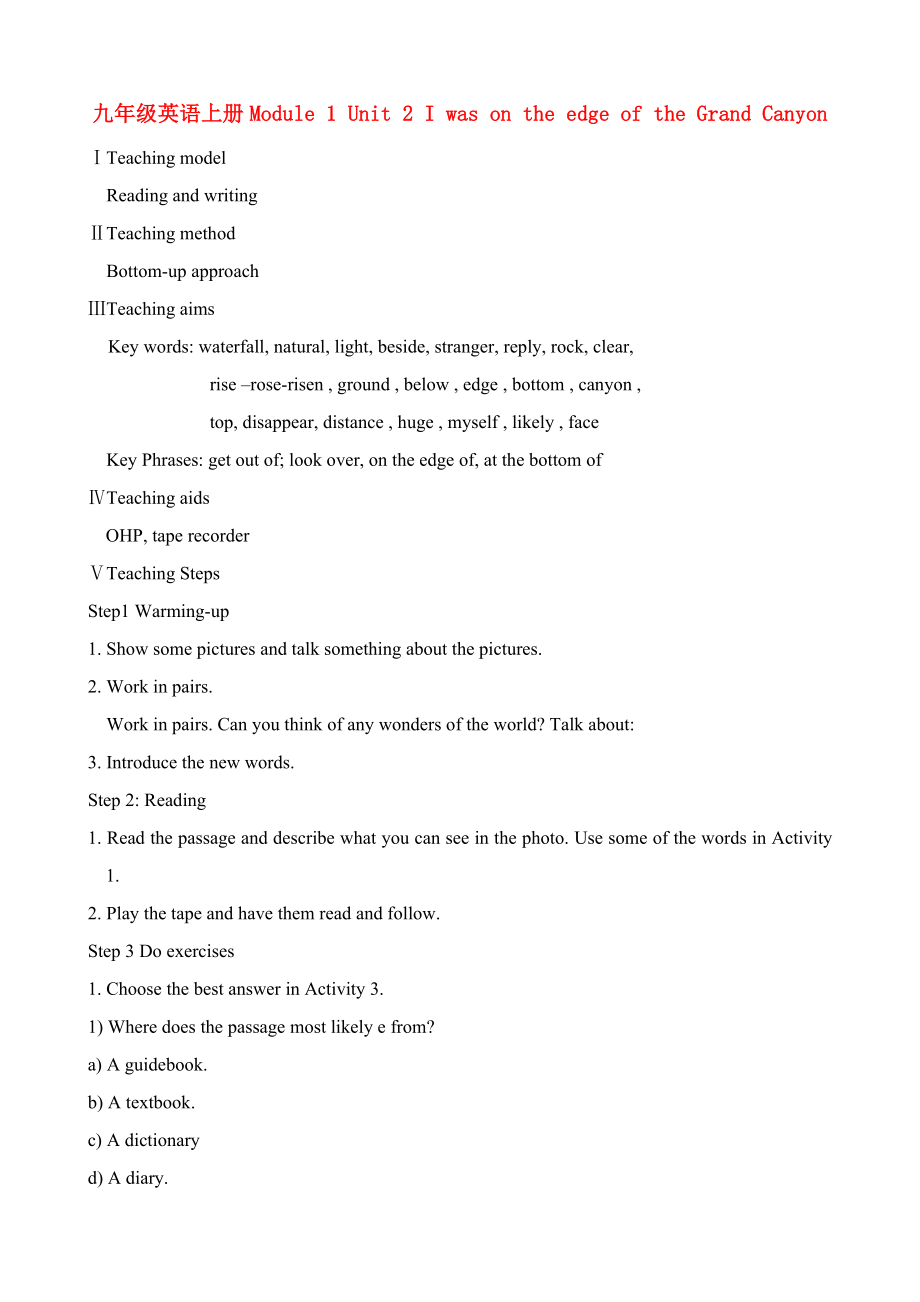《九年級(jí)英語(yǔ)上冊(cè)Module 1 Unit 2 I was on the edge of the Grand Canyon》由會(huì)員分享�,可在線閱讀�,更多相關(guān)《九年級(jí)英語(yǔ)上冊(cè)Module 1 Unit 2 I was on the edge of the Grand Canyon(3頁(yè)珍藏版)》請(qǐng)?jiān)谘b配圖網(wǎng)上搜索。
1��、九年級(jí)英語(yǔ)上冊(cè)Module 1 Unit 2 I was on the edge of the Grand Canyon
ⅠTeaching model
Reading and writing
ⅡTeaching method
Bottom-up approach
ⅢTeaching aims
Key words: waterfall, natural, light, beside, stranger, reply, rock, clear,
rise –rose-risen , ground , below , edge , bottom , canyon ,
top, di
2���、sappear, distance , huge , myself , likely , face
Key Phrases: get out of; look over, on the edge of, at the bottom of
ⅣTeaching aids
OHP, tape recorder
ⅤTeaching Steps
Step1 Warming-up
1. Show some pictures and talk something about the pictures.
2. Work in pairs.
Work in pairs. Can you
3�、 think of any wonders of the world? Talk about:
3. Introduce the new words.
Step 2: Reading
1. Read the passage and describe what you can see in the photo. Use some of the words in Activity 1.
2. Play the tape and have them read and follow.
Step 3 Do exercises
1. Choose the best answer in Acti
4���、vity 3.
1) Where does the passage most likely e from?
a) A guidebook.
b) A textbook.
c) A dictionary
d) A diary.
2) Why was there nothing to see?
a) Because there was nothing.
b) Because it was too dark.
c) Because it was raining.
d) Because it was in the morning.
3) Where was the writer
5���、facing on the edge of the Grand Canyon?
a) To the south.
b) To the north.
c) To the east.
d) To the west.
4) What is the writer's purpose in writing this passage?
a) To give facts about the Grand Canyon.
b) To tell how he feels about the Grand Canyon.
c) To introduce the Grand Canyon.
d) To
6、 tell people to visit the Grand Canyon.
2. Match the words in the box with their meanings in Activity 4.
3. plete the table with facts about the Grand Canyon in Activity 5.
Step 4 Explain the important and difficult points
1. The sun rose behind me and beyond the rocks. I saw that the ground fe
7、ll away and down to a river, far below me.
太陽(yáng)從位于我身后的巖石遠(yuǎn)處升起.我看到地面沉降至下面深谷中的一條河里.
2. I was on the edge of the Grand Canyon, one of the wonders the natural world.
我站在大峽谷邊緣,它是自然界中的奇觀之一.
3. I looked down to the Colorado River about 2,000metres below me.
我俯視著距我兩千多米之遙的科羅拉多河.
Then I looked across to
8�、 other side of the canyon.
然后,我眺望峽谷的另一邊.
Finally, I looked to my left and to my right.......
最后,我向左右遙望......
在上面這三個(gè)句子中, look 和不同的介詞/副詞組成不同的詞組,有著不同的意思. look down表示“向下看”; look across表示"向?qū)γ婵?; look to one's left 表示"向某人左側(cè)看".還有很多介詞/副詞可以和look這個(gè)動(dòng)詞組成詞組,如;
Look over there---there's a rainbow!
看那邊!彩虹
9、!
She looked up and smiled at me.
她抬起頭來,沖我笑了笑.
4. Learning to learn
Step 5 Writing
1.Make a table with facts about:
the Changjiang River the Great Wall
2.Imagine you have seen one of the wonders of the world. Write sentences describing how you felt when you saw it for the first time.
Step6 Homework
Finish the exercises in the workbook Ex. 5, 6, 7&8.
 九年級(jí)英語(yǔ)上冊(cè)Module 1 Unit 2 I was on the edge of the Grand Canyon
九年級(jí)英語(yǔ)上冊(cè)Module 1 Unit 2 I was on the edge of the Grand Canyon

